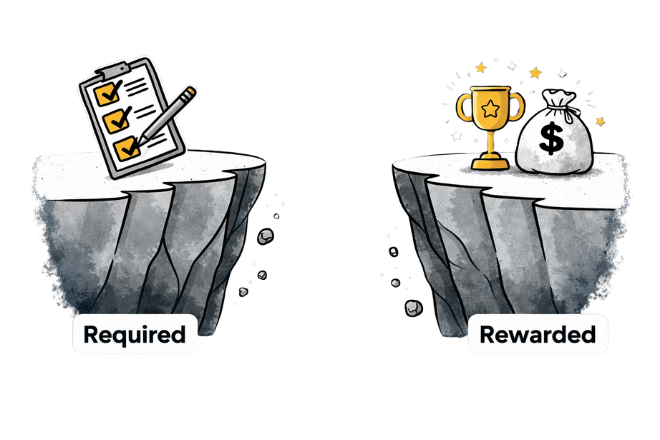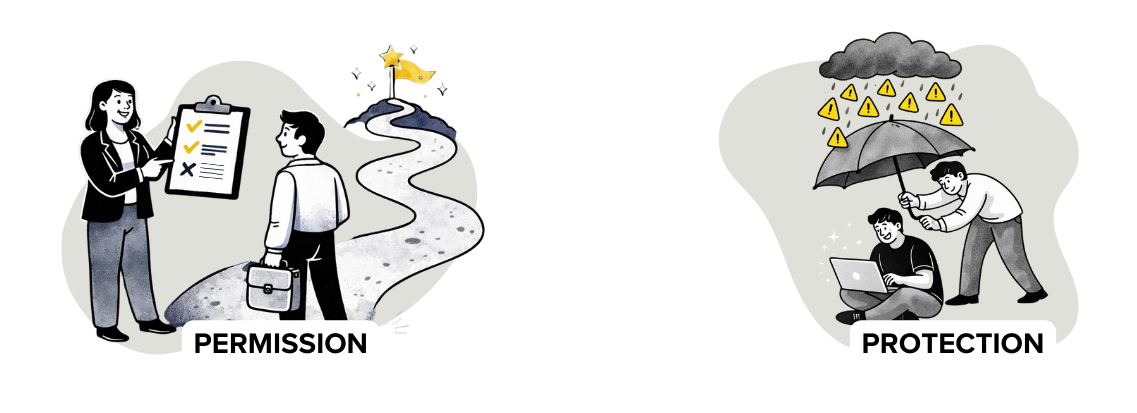Cultivating courage
Note: This post is part of a series about The Transformation Flywheel, in which we explore how to nurture the conditions that generate sustainable momentum for transformative change.
Watch any transformation program long enough, and you'll see the same pattern. Week one: ambitious proposals, big ideas, genuine excitement about what's possible. Week twelve: watered-down compromises, hedge-your-bets recommendations, "let's take a phased approach" instead of the bold move everyone knows is needed.
What happened in those eleven weeks? Nobody got fired for thinking big. No one publicly shot down the ambitious ideas. But somewhere between the kickoff meeting and the steering committee review, everyone learned the real rules. And the real rules say: don't stick your neck out.
McKinsey reports that 70% of digital transformations fail to meet their goals. But here's the part nobody wants to examine—most of those "failures" delivered exactly what the organization's culture was designed to produce. Incremental improvements. Safe bets. Nothing that would actually disrupt how things work.
You can't transform anything when everyone's playing not to lose.
The Courage Problem Nobody Wants to Name
Transformation requires people to stick their necks out. To challenge convention. To try things that might not work. To prioritize progress over perfection. To think bigger than the quarterly planning cycle.
But most organizations have spent decades training people to do the opposite. Don't make waves. Get consensus before acting. Avoid mistakes at all costs. Protect your budget, your headcount, your turf.
Then leadership announces a transformation and expects everyone to suddenly become bold risk-takers. It doesn't work that way.
The gap between what transformation requires and what your culture rewards is where momentum goes to die. You can have the clearest strategy in the world, but if people are scared to actually execute it, you're just rearranging deck chairs.
This isn't about individual cowardice. Most people in your organization would love to do more meaningful work, take on bigger challenges, and try new approaches. The problem is institutional. Your culture has systematically engineered out the conditions that make courage possible.
What Actually Makes People Brave
Here's what most leadership teams get wrong: they think courage is about inspiration. Give people a compelling vision, paint the burning platform, rally the troops. Problem solved.
Except courage doesn't come from motivation. It comes from permission and protection.
Permission means people know explicitly what they're allowed to try, what decisions they can make without approval, and what "good failure" looks like. Protection means that when someone takes a smart risk that doesn't pan out, they don't get punished for it.
Most organizations do neither. They give vague mandates to "be innovative" without defining the boundaries. They say "it's okay to fail" but then promote the people who never made mistakes. The mixed messages are deafening.
So people do what rational actors do in that environment: they play it safe. They propose the version of the idea that won't get killed in review. They wait for someone else to test the water first. They optimize for not getting blamed rather than for creating impact.
And your transformation stalls out before it really begins.
Here are 6 key actions that give teams the permission and protection to be more courageous:
Vague transformation goals breed timid execution. "Become more customer-centric" doesn't tell anyone what they should actually do differently or what matters enough to take risks over.
You need specific, tangible goals with clear measures of success. Not just "improve customer experience" but "reduce time-to-resolution by 40% within six months" or "launch a new digital channel that captures 15% of transactions by year-end."
When people understand exactly what you're trying to achieve and why it matters, they can evaluate whether a risky move serves that goal. Without that clarity, every risk feels like a potential career-limiting move.
But here's the part most leaders skip: you also need to communicate what this means for how work gets done. Not just what will be different, but how people's day-to-day decisions and priorities need to change. That requires dialogue, not just announcement. Create real opportunities for people to ask questions, surface concerns, and internalize what this transformation means for their role.
Engagement and understanding breed conviction. Conviction breeds courage.
Every organization claims to value psychological safety now. It's in the values deck. It gets mentioned in town halls. But most of what passes for psychological safety is just politeness.
Real psychological safety means people can say "I think this strategy is wrong" in a meeting without career consequences. It means someone can surface a problem with a leader's pet project without getting frozen out of decisions. It means a failed experiment gets a retrospective, not a witch hunt.
You'll know you have real psychological safety when people start challenging things publicly that they used to only complain about in the hallway. When junior employees question senior leaders' assumptions in meetings. When someone says, "we tried this before and here's why it didn't work" without getting told to be more positive.
This doesn't happen by declaring it. It happens when leaders demonstrate it through action—by welcoming dissent, by admitting their own mistakes, by visibly protecting people who take smart risks that don't work out.
Most organizations talk about innovation but structure work in ways that make exploration impossible. Everyone's calendar is full. Every project is urgent. There's no slack in the system for trying things that might not work.
You can't get courageous experimentation from people who are already at 110% capacity doing business-as-usual work. Something has to give. Either you protect time for exploration—hackathons, innovation sprints, dedicated percentage of time for experimentation—or you're just paying lip service to the idea.
This also means giving people access to resources to test ideas. Budget for prototypes. Access to customers for research. Technical infrastructure to build and test solutions. If every experiment requires three months of approvals and a business case, nobody's going to experiment.
The best organizations we work with formalize this. They allocate specific time, budget, and permission for teams to pursue emergent opportunities. They create explicit mechanisms for experimentation rather than hoping it happens in the margins.
Here's the uncomfortable truth: if your transformation isn't generating some failures, it's not ambitious enough. Safe bets don't transform anything.
But most organizations say they embrace failure while their actions say the opposite. Who gets promoted? The person who delivered on time and on budget by playing it safe. Who gets scrutinized? The person who tried something bold that didn't work.
You need to explicitly distinguish between good failure and bad failure. Good failure is a well-reasoned experiment that didn't work but generated valuable learning. Bad failure is negligence, lack of planning, or ignoring obvious warning signs.
Celebrate the good failures. Do retrospectives on what you learned. Share those learnings across the organization. Make it clear that generating insights from failed experiments is valuable work, not a career setback.
And critically, when someone takes a smart risk that doesn't pan out, don't shuffle them off to a less visible role. Keep them in the game. Show everyone else that you meant it when you said failure is part of learning.
Your promotion and recognition systems are probably optimized for execution and delivery. Hit your numbers, deliver your projects, manage your budget. All important, but none of it requires courage.
If you want more courageous behavior, you have to explicitly reward it. Recognize people who challenge the status quo. Celebrate teams that try new approaches even when they don't pan out. Promote people who take smart risks, not just those who never made mistakes.
This feels risky to leaders. What if we reward someone who keeps failing? But here's what you need to keep in mind: you're already taking a risk by rewarding only safe behavior. You're guaranteeing that your transformation will be timid and incremental.
The goal isn't to reward recklessness. It's to reward calculated risk-taking and learning. The person who runs five experiments, learns from three failures, and generates two breakthroughs is more valuable to transformation than the person who delivered twelve predictable projects on time.
This is where many leadership teams fail the courage test. They ask everyone else to be bold while they themselves only make moves that are sure bets.
You want people to challenge convention? Start challenging your own conventions in visible ways. Try something that might not work and talk openly about it. Admit when you were wrong about something. Kill a project you personally championed when the data says it's not working.
Leaders who demonstrate vulnerability and uncertainty give their teams permission to do the same. Leaders who only show up with polished certainty teach their teams to hide doubt and fake confidence.
This doesn't mean leadership should be chaotic or indecisive. It means being honest about the inherent uncertainty in transformation work. Acknowledging when you're making a bet based on hypothesis rather than certainty. Showing how you think about risk and learning, not just results.
When leaders model this behavior, it cascades. When they don't, no amount of talking about psychological safety and innovation will overcome the example they're setting.
The One Thing That Still Might Go Wrong
Even if you do all of this, there's still a complicating factor: some people won't want to be courageous, no matter how safe you make it.
Not everyone thrives in environments of uncertainty and experimentation. Some people joined your organization specifically because it felt stable and predictable. Asking them to suddenly embrace ambiguity and risk isn't just a culture shift—for some people, it's fundamentally incompatible with what they value in work.
That's okay. Transformation doesn't require everyone to be a bold risk-taker. It requires enough people with enough courage in enough critical places to create momentum. Some roles need stability and execution more than experimentation.
The key is being honest about this rather than pretending everyone will transform equally. Figure out where you genuinely need courage and risk-taking versus where you need reliable execution. Staff accordingly. Don't force everyone into the same mold.
But for the people and teams who are central to your transformation—the ones who need to challenge convention, experiment with new approaches, and push boundaries—you have to create the conditions that make courage possible. Not optional. Not nice-to-have. Essential.
Making Courage the Norm, Not the Exception
We worked with a financial services company whose digital transformation had stalled. Not because the strategy was wrong or the technology was lacking. Because everyone had learned that proposing anything truly different was a great way to get endless questions, require multiple approvals, and ultimately watch your idea die in committee.
So teams proposed only incremental changes. Innovations that looked like minor improvements to existing processes. Nothing that would truly transform the customer experience or the operating model.
We helped them redesign how decisions got made and how experiments got funded. We created explicit permission structures—here's what teams can try without approval, here's the budget for experimentation, here's what good failure looks like. We worked with leadership to visibly celebrate learning from failed experiments and recognize people who took smart risks.
Six months later, the pipeline of proposed innovations had tripled. But more importantly, the nature of proposals changed. Teams were suggesting things that would actually transform customer experiences and business models, not just optimize existing processes.
The strategy hadn't changed. The technology hadn't changed. What changed was that people believed they had permission and protection to actually try transformative things.
That's what institutional courage looks like. Not individual heroics or inspiring speeches. A systematic approach to creating the conditions where challenging convention becomes normal, where smart risks get taken and learned from, where momentum builds because people believe they can actually make meaningful change.
If your transformation feels stuck, check whether the problem is strategy or courage. Often it's the latter. And the good news is, courage is cultivable. You just have to be intentional about creating the conditions that let it flourish.
Otherwise, you'll keep getting safe proposals that look like transformation but deliver incremental improvement. And three years from now, you'll be launching another transformation to fix the problems the first one didn't solve.
Need to cultivate courage in your team or organization? Beacon Advisory can help. We partner with ambitious leaders to accelerate business transformation and create new trajectories for growth. We’ll help you get your shift together.









